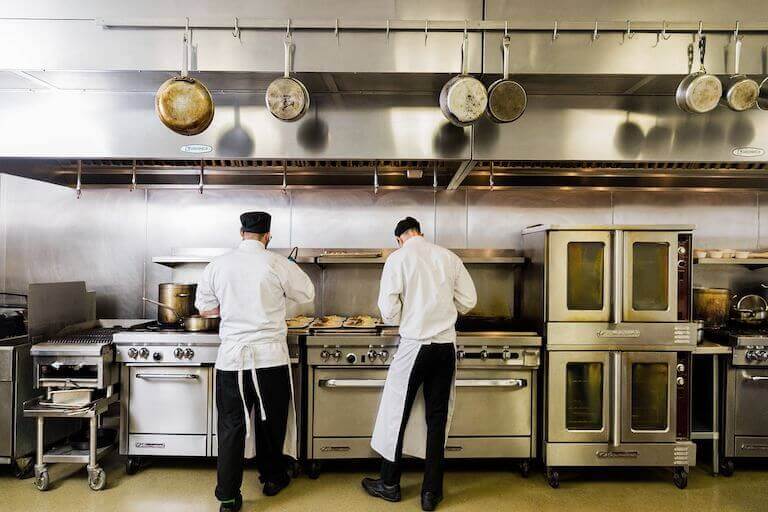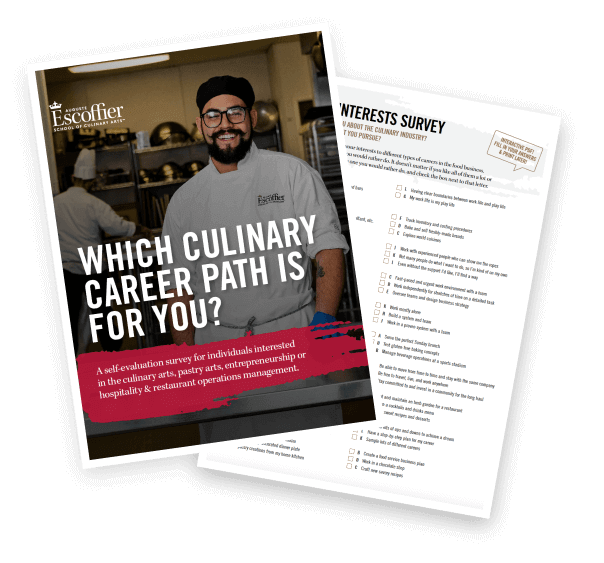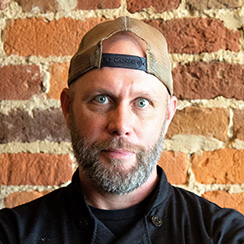We all want to get from where we are now to our dream career, with as few stops as possible.
So that begs the question: is culinary school really a necessary stop on the path to becoming a chef?
After all, can’t you learn all of the techniques that you’re taught in school while working in kitchens? While this might be true, we’re going to explore how a culinary school education may get you a more comprehensive education—faster—than learning on the job. Plus, find out the benefits of culinary school beyond what happens in the classroom.
Can You Become a Chef Without Culinary School?
In short? Yes. You can become a successful chef without going to culinary school.
There is no special degree or certification that makes someone a chef. The title is earned through hard work and experience. Gordon Ramsay and award-winning chef Heston Blumenthal, for example, didn’t attend culinary school. But other big names like Alton Brown, Anthony Bourdain, and Milk Bar’s Christina Tosi did.
While it’s possible to become a successful chef without school, skipping education may put you at a disadvantage as you start your culinary career. Here are a few considerations to factor in as you decide.
Culinary School Offers More than Just Cooking Skills
In an accredited culinary school, students typically follow a carefully crafted curriculum that can teach them a wide range of skills. Starting with basic cooking methods and moving through regional and world cuisines, patisserie, sustainability, and much more, each course may build on the one before for a thorough groundwork in culinary arts.
And by focusing your attention on your studies for several months, you can learn much more quickly than you would “on the job.”
“If you want to learn, you should go to culinary school. You’ll be exposed to a lot more in a very short period of time. You could spend ten years working in restaurants and not get the experience that you’re going to get working with pastries with Chef Suzanne, for instance.”
Brent Unruh, Escoffier Boulder Culinary Arts Graduate*
But there’s more to culinary school than the cooking. There are additional benefits that may be hard to replicate outside of the school environment.

Network with Cooks and Chefs in Culinary School
During your time in a program at Escoffier, for example, you can spend your days alongside other passionate cooks and chefs. Even if you study in an online culinary school program you can have the opportunity to connect with your classmates through online forums or potentially meet them through optional in-person experiences like the Farm to Table® weekend workshops.
And after graduation, you can have access to the Auguste Escoffier Alumni Association. These connections may be able to answer your industry and career questions, provide valuable advice, and could even be sources of future job opportunities.
Find Valuable Mentorship in Culinary School
In the school environment, students can meet and learn from many Chef Instructors as they proceed through their courses. These experienced educators are also professional chefs. They’ve been the lowest on the totem pole. They’ve been the boss. They’ve worked their way up, just like you can have the opportunity to do.
These experts often provide helpful mentorship to students and graduates, advising them as they navigate their careers.
“Throughout my time in culinary school, Chef Jesper Jonsson and Chef Julia Wolf were my main teachers or mentors… They always reassured me that things would get better and what my worth was. They were great mentors of mine, and I’m very happy that I got to know them.”
Parker Wilks-Bryant, Escoffier Boulder Culinary Arts Graduate*
Get Career Assistance in Culinary School
At Escoffier, the Career Services staff is ready and willing to help students and graduates with interview preparation, resume writing, and networking opportunities, and job listings. With this resource, you can go into each interview more prepared and ready to wow the hiring chef. This extra assistance could be the push that gets you the job!*

The Steps to Becoming a Chef
While the details may change, the basic steps to becoming a chef are usually similar across the industry. Here’s what your path may look like:
1. Earn a Degree or Diploma
While not a requirement, a degree or diploma from a reputable culinary school can get your career started on the right foot. With the knowledge you can bring from school to your first job in the industry, you can have the necessary context for the tasks you’re asked to perform.
Preparing a special egg-based sauce? “Ah, that’s just a riff on a hollandaise,” you may say. “I know how to do that!”
Tasked with putting away the day’s meat delivery? “Oh, I have sanitation training. I know what proteins have to be on the top shelves and what have to be on the bottom.”
While you can expect to get additional training on the job, bringing this type of education with you can help you to pick up recipes and rules that much faster—because you already know the reasoning behind them.

Take the Culinary Career Survey
We’ve compiled a checklist of all of the essential questions into one handy tool: career options, culinary interest surveys, educational opportunities, and more.

2. Get Training and Work Experience
At Escoffier, all students must complete their culinary school programs with either one or two externships. With this experience, you can come to your first official job with a bit of exposure to a professional kitchen. Familiarity with the fast pace of the professional kitchen and preparation for the noise and bustle may benefit you for that first position.
After completing your education, you may be ready for your first entry-level culinary job. Unless, of course, you came to culinary school with industry experience already under your belt! Military veteran Lance McWhorter, for example, was already an executive chef when he decided to attend Escoffier’s online culinary arts program to refine his skills and fill in the gaps in his knowledge!
“I was working as the executive chef of one restaurant when I started culinary school… Even when I was the executive chef, I still needed to learn. You still need to grow. Everything about you—your cooking chops, your palate, your knowledge base, your creativity—need to always be expanding.”
Lance McWhorter, Escoffier Online Graduate; Executive Chef/Owner, Culture ETX; Food Network’s “Chopped” Contestant*
3. Get Additional Certifications
While degrees, diplomas, and certifications aren’t requirements to becoming a chef, they can indicate a certain level of proficiency in the culinary arts.
Culinary certifications through the American Culinary Federation, for example, start with Certified Fundamentals Cook® and progress all the way to Certified Master Chef®—a rank so exclusive, there are only 67 chefs who currently have the designation. Escoffier’s own Director Of Culinary Industry Development is Certified Master Pastry Chef® Frank Vollkommer, who is one of only eleven pastry chefs to have this credential.
While these certifications certainly aren’t a prerequisite to becoming a chef, they can help you to prove your expertise and any niches you’ve mastered as you search for jobs or make the case for a promotion.
4. Work Your Way Through the Ranks
At your first entry-level job, your responsibilities will vary. But as you master each task that’s asked of you, you’ll be building toward the next rung on the kitchen ladder. From prep cook to line cook, line cook to lead cook, lead to kitchen manager or sous chef—whatever your exact path looks like, each step along the way can get you that much closer to the coveted title of chef.
And the foundations you bring with you from culinary school may help you to make the journey more quickly.

Get Your Education Now and Benefit for Years to Come
While it can be tempting to rush off into your career without the education step, you may later find yourself wishing you’d gone. Many Escoffier students are established cooks and chefs who realize that even with years of experience, there are benefits to attending school that they’ve been missing.*
By going to school early in your career—instead of 10 or 20 years down the line—you’ll be bringing that knowledge to every job you have throughout your career. And it just may get you to that coveted “chef” title—along with its associated salary—that much more quickly.
Take a closer look at the degree and diploma programs available at Escoffier to see which one may help you reach your goals.
To learn more about culinary education and how it can help you get closer to your dreams, try these articles next.
- How Long Does it Take To Get an Online Culinary Arts Degree?
- The Pros and Cons of Vocational School: Is It Right for You?
- Job or School: Why Not Both?
*Information may not reflect every student’s experience. Results and outcomes may be based on several factors, such as geographical region or previous experience.

 “I was working as the executive chef of one restaurant when I started culinary school… Even when I was the executive chef, I still needed to learn. You still need to grow. Everything about you—your cooking chops, your palate, your knowledge base, your creativity—need to always be expanding.”
“I was working as the executive chef of one restaurant when I started culinary school… Even when I was the executive chef, I still needed to learn. You still need to grow. Everything about you—your cooking chops, your palate, your knowledge base, your creativity—need to always be expanding.”

